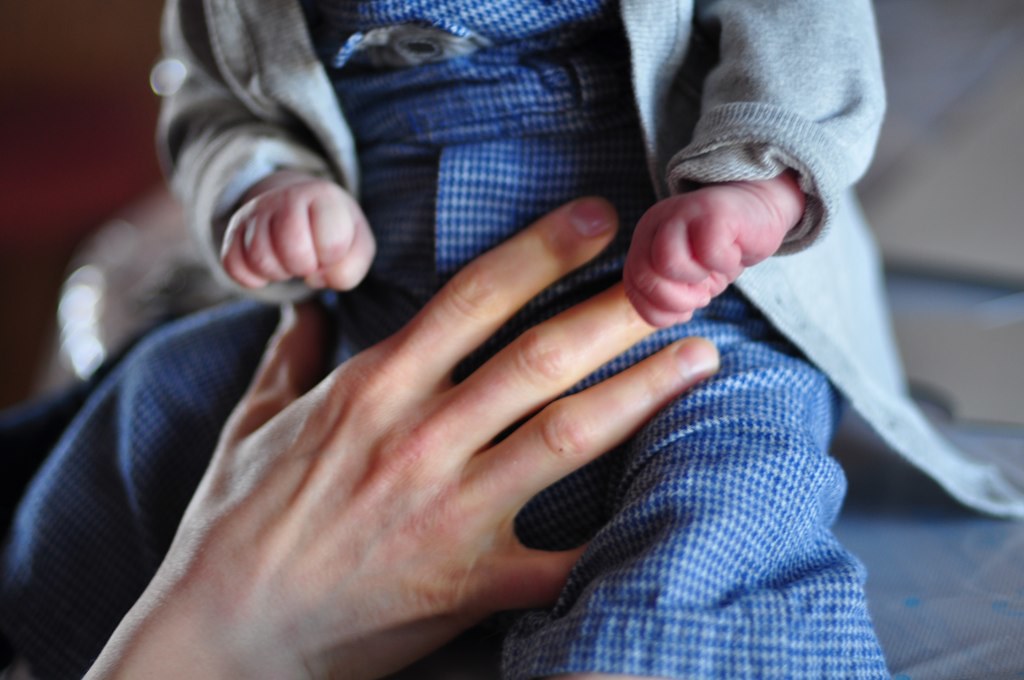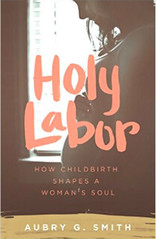It’s not everyday you ask someone about her opinion on suffering in childbirth and she tells you that it leaves her on her face, weeping in awe of God—but then, not every mama goes on to write a book to encourage other mamas to rethink the topic, either! Aubry G. Smith is a cheerleader for those who dig deeper and are transformed by finding God in the metaphors and realities of childbirth (including the pain). In her new book, Holy Labor: How Childbirth Shapes a Woman’s Soul, her story and her thoughts and her Bible are wrapped up in each other as she learned to walk by God’s spirit in her biggest ups and downs. It’s a grace to welcome Aubry to the farm’s front porch today…
Recently, a dear friend of mine was diagnosed with post-traumatic stress disorder.
She went through intense counseling to peel back the layers of many past abuses and traumas that she had avoided for years.
She had horrific, violent nightmares and flashbacks that paralyzed her.
She had panic attacks almost constantly, and her deep depression left her barely functional.
As she and her counselor continued for several months and she was able to open deeper wounds, it only got worse. She was in utter despair, certain that she would never function normally again.
One day she cried out in hopelessness to me, “I just can’t do it anymore!” And then, soon after, the panic attacks came less frequently. The nightmares dropped off, and the flashbacks no longer controlled her.







It wasn’t that she had figured out how to not think about the hard things anymore; it was that she had gotten through to the other side. At the moment she believed she couldn’t push through another second, she suddenly did and found new life.
There was no way out but through.
Childbirth is used in Scripture as a metaphor for the suffering of God’s people as they await delivery in hope.
Various biblical writers often speak of trials and persecutions in terms of labor, like contractions that squeeze and push and cause anxiety. But the point of these passages is that the Day of the Lord is coming, that these sufferings result in new life being born from the old.
In John 16, Jesus tells His disciples that He is about to die and they will grieve, but then He will be raised again to life.
Jesus speaks of grief and pain as temporary sorrows that will at some point give way to new life and joy. Here He uses the clear metaphor of childbirth to put His death and the disciples’ grief in proper perspective: These birth pangs must happen so that new life can be birthed.
Paul talks about creation being in the pains of childbirth, as well as our own groans as we await our adoption (Rom 8:18–27). These pains and groans will someday birth new creation, “liberated from its bondage to decay and brought into the freedom and glory of the children of God” (Rom 8:21). He goes on to describe the redemption of our bodies as being birthed from the pains of the present time and says that we should wait patiently in this hope.
We need these moments of getting through to the other side as memorials in our lives, pillars to look at and remember our darkest trials of life.
Childbirth provides such a milestone, where we can look back and say, “Yes, I’ve been here in despair before, right where I wanted to quit, and I endured and saw life on the other side.” Those moments provide us with a precedent for the future.
This relationship we build with Jesus through labor will enable us to wait with Him in hope for new life on the other side. If we follow Jesus, we know that we have willingly taken up a cross and persecution and trials. But with the cross, we also lay hold of resurrection.
The Bible uses the metaphor of birth for suffering that brings new life—because this is what the Bible is about. Birth pangs are not merely pain; they are forces that push new life out of the old.
Even God writhes in labor in His creative power to bring life.
So in our anguished moments—whether in childbirth or in other parts of our lives—we can approach the throne of grace with confidence, knowing we will receive grace to help in our time of need (Heb 4:16).
Childbirth can be a training ground where we remind ourselves of Jesus’ union with us in His humanity and His ministry now of listening to our prayers and granting us grace when we need it—especially in our weakness.
For husbands and other birth supporters who have not personally given birth, coming alongside a woman in labor carries tremendous value. Simple gestures—like offering a sip of water, providing a needed back massage, or a loving word when despair sets in—can carry a woman through her weakest moments.
Laboring mothers need to be reminded of God’s love and goodness, of the hope and resurrection on the other side of the despair. In this way, even those who are with a woman in her labor can be transformed as they learn to wait with others in their trials, as they have an opportunity to forego food, sleep, and comfort to support someone who is vulnerable—actions that are done as for Jesus himself (Matt 25:37–40). These simple gestures of encouragement and support can make all the difference to a laboring woman as she reaches for hope and strength.
Most of us may not be able to fully escape pain in labor.
None of us will escape pain in life.
Submitting ourselves to the care of our creator in childbirth can act as practice for when hardships come and endurance through suffering is needed, knowing that birth pangs give way to transformation and new life.
Instead of seeking escape, may we root ourselves deeply in Him, holding fast to Him whatever may come, in labor and in life.
Aubry G. Smith wrote Holy Labor across three children’s births, through doula training, and out of myriad conversations with other mothers. She’s a mama of three, a writer, a student of Arabic in the beautiful Middle East—and an unapologetic advocate for the truth in spaces where it needs to be heard.
Holy Labor: How Childbirth Shapes a Woman’s Soul speaks to new mothers, guiding them through the birth process and showing them how to discover God’s grace in the midst of pregnancy and birth. For mamas and mamas-to-be, it’s a soul-satisfying walk alongside Aubry through birth’s trials and joys and what the Bible has to say on birth—both firsthand experience of it, but also on birth injustice and care for mothers around the world. Moms and non-moms alike need to listen to her words and learn to see God anew—as the parent who births us into new life.
[ Our thanks to Kirkdale Press for their partnership in today’s devotion ]








